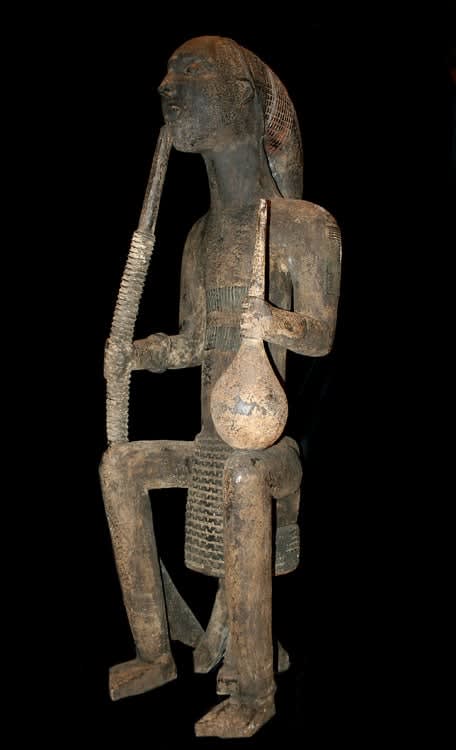Cameroon Grasslands Sculpture of a Smoker, 20th Century CE
wood
64
GD.123 (LSO)
This imposing sculpture of a smoker displays characteristics of Cameroonian art. The figure is seated, implying high status, and is particularly spindly in terms of build, with elongated limbs and...
This imposing sculpture of a smoker displays characteristics of Cameroonian art. The figure is seated, implying high status, and is particularly spindly in terms of build, with elongated limbs and a long, thin torso. The body is naked except for an ornately decorated loincloth. The figure is holding a gourd in the left hand and the long pipe of a hookah in the right. The figure is evidently male, with an ornate low-crested coiffure and a reductivist face. The patina is regular and dark.
Cameroon contains various tribes that share social and cultural characteristics and which are integrated into a widespread network of small, quasi- independent kingdoms. The main ethnic groups are the Bamileke, the Bamenda-Tikar and the Bamum. The nature of rule and hierarchy in these groups varies somewhat, but in general terms the king/fon/leader of the group and his courtly associates are equipped with regalia and prestige objects for the general purpose of conspicuous consumption. Societies and even private individuals were permitted to hold various sorts of regalia according to their status, leading to a proliferation of craftsmen and artists who occupied valuable social roles within the community. Most of the figures commemorate deceased royals whose memory is sacred to the continuity of the royal succession.
The large size of this piece implies that it had a centralised rather than personal role. The symbolism is uncertain, but the cost of tobacco and the seated posture of the figure suggest that it represents somebody of considerable prestige, probably a king.
Cameroon contains various tribes that share social and cultural characteristics and which are integrated into a widespread network of small, quasi- independent kingdoms. The main ethnic groups are the Bamileke, the Bamenda-Tikar and the Bamum. The nature of rule and hierarchy in these groups varies somewhat, but in general terms the king/fon/leader of the group and his courtly associates are equipped with regalia and prestige objects for the general purpose of conspicuous consumption. Societies and even private individuals were permitted to hold various sorts of regalia according to their status, leading to a proliferation of craftsmen and artists who occupied valuable social roles within the community. Most of the figures commemorate deceased royals whose memory is sacred to the continuity of the royal succession.
The large size of this piece implies that it had a centralised rather than personal role. The symbolism is uncertain, but the cost of tobacco and the seated posture of the figure suggest that it represents somebody of considerable prestige, probably a king.
